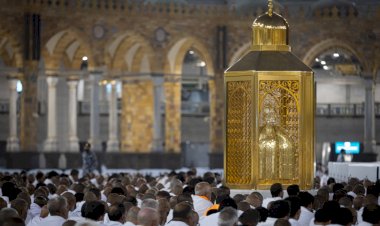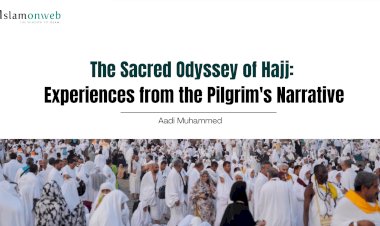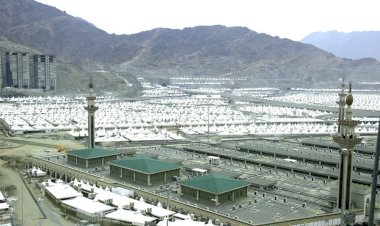Talbiyah: The Soulful Proclamation of Tawhid in Hajj
"Labbaik Allahumma labbaik, labbaik la sharika laka labbaik, innal hamda wannimata laka wal mulk, la sharika lak." These are the words we repeatedly hear as the guests of Allah perform the acts of Hajj. This is known as Talbiyah. Linguistically, as mentioned in "Lisan al-Arab" by Ibn Manzur, Talbiyah means "responding to the caller," and it is also used to denote "remaining in obedience." Technically, Talbiyah is the recitation of the Muhrim (one who has entered the rituals of Hajj and Umrah): "Labbaik Allahumma labbaik, labbaik la sharika laka labbaik, innal hamda wannimata laka wal mulk, la sharika lak."
The declaration of Allah’s oneness (Tawhid) and dedicating worship solely to Him is the foundation of the religion and the pivot around which all acts of worship and deeds revolve. Allah created creation for the purpose of Tawhid, as He says: {And I did not create the jinn and mankind except to worship Me} (Adh-Dhariyat: 56). Abdullah ibn Abbas explained this as "to declare His oneness." The pilgrim begins their Hajj with Tawhid, continuously reciting the Talbiyah with Tawhid, and moving from one act to another with Tawhid. The motto of Hajj is Tawhid from the very first moment the pilgrim dons the Ihram.
The Talbiyah, which is the motto of Hajj and was consistently recited by the Prophet ﷺ, includes the declaration of Tawhid, affirming the worship of Allah alone and directing all intentions and purposes to Him.
Abdullah ibn Umar (may Allah be pleased with him) reported that the Talbiyah of the Messenger of Allah (peace and blessings be upon him) was: "Labbaik Allahumma labbaik, labbaik la sharika laka labbaik, innal hamda wannimata laka wal mulk, la sharika lak" (Bukhari). Jabir ibn Abdullah (may Allah be pleased with him) described the Prophet's Hajj: "Then he proclaimed the oneness of Allah, saying: 'Labbaik Allahumma labbaik, labbaik la sharika laka labbaik, innal hamda wannimata laka wal mulk, la sharika lak'" (Muslim).
The wisdom behind the Talbiyah, is that its institution signifies Allah’s honor to His servants, as their arrival at His House is by His invitation.
The Talbiyah carries several meanings:
Labbaik Allahumma labbaik, labbaik la sharika laka labbaik : It is a repeated response to Allah’s call, indicating ongoing and continuous obedience. It means submission to Allah, act after act, and love for him, love after love. The repetition of the Talbiyah confirms the servant's response to their Lord and their commitment to obedience and proclamation of his oneness while denying any association or partnership with him.
"Innal hamda wannimata laka wal mulk, la sharika lak": You, glorified are You, are worthy of gratitude and praise because You alone possess absolute perfection. You are the true bestower of all blessings, and every blessing originates from You. You alone possess everlasting sovereignty, and all other dominion is temporary and will vanish.
Moreover, the Talbiyah, with its essence of Tawhid, obedience, and submission to Allah’s command, also includes acknowledging all apparent and hidden blessings from Allah alone. Allah says: {And whatever of blessings and good things you have, it is from Allah} (An-Nahl: 53). With the words La-Sharika lak, we affirm that there is no partner with Allah and all blessings are from him alone.
Motto of Hajj
The Talbiyah is a significant ritual of Hajj, and raising the voice in Talbiyah signifies the proclamation of this great ritual and the declaration of Tawhid of Allah.
It is practised during Hajj and Umrah at the time of entering the Ihram. Ahmad and Ibn Hibban narrated that the Prophet ﷺ said: “O family of Muhammad, whoever among you performs Hajj, let them raise their voice in Talbiyah during their Hajj.” The meaning of "raise their voice" is to recite the Talbiyah aloud. Scholars unanimously agree with this practice.
Fiqh of Talbiyah:
Shafi’i and Ahmad said it is a Sunnah and it is recommended to connect it with entering Ihram. If one enters the Ihram without reciting the Talbiyah, their Ihram is still valid, and there is no penalty.
The Hanafis state that Talbiyah—or its equivalent, such as Tasbih (glorification)—is a condition for the validity of Ihram. If one enters Ihram without reciting Talbiyah or glorifying or without offering a sacrificial animal, their Ihram is not valid.
The majority view among Malikis is that it is a Sunnah, although some say it is obligatory. Ihram is valid without it but requires a compensatory sacrifice. For a comprehensive view of its ruling, refer to books of jurisprudence.
Time for Talbiyah:
The time for Talbiyah begins with Ihram and ends with the stoning of Jamrat al-Aqabah. The consensus of the narrators is that the Prophet ﷺ continued reciting Talbiyah until he reached the Jamrah, which is the opinion of the majority of scholars. Malik stated that Talbiyah continues until the sun sets on the day of Arafah, then the pilgrim stops it. Ahmad said it does not end until all the Jamrat are stoned. For those performing Umrah, Talbiyah ends once tawaf starts, as the Prophet ﷺ did, narrated by Tirmidhi with a sound chain through Ibn Abbas.
Talbiyah is recommended in many situations: when riding or dismounting, ascending high places, descending valleys, meeting a caravan, after prayers, at dawn, and at all times, as Shafi’i mentioned.
Form of Talbiyah:
The form of Talbiyah narrated by Malik from Nafi’ from Ibn Umar is: “Labbaik Allahumma labbaik, labbaik la sharika laka labbaik, innal hamda wannimata laka wal mulk, la sharika lak” (Bukhari). Sticking to the form of Talbiyah recited by the Prophet ﷺ is recommended.
Scholars differ on adding additional words to the Talbiyah. The majority consider it permissible, as Ibn Umar added, “Labbaik, labbaik, labbaik wa sa’daik, wal khair biyadaik, waraghba’ ilaik wal amal.” The Companions and the Prophet ﷺ heard these additions and did not object (narrated by Abu Dawud and al-Bayhaqi). Malik disapproved of adding to the Prophet’s ﷺ Talbiyah. It is recommended to follow it with prayers on the Prophet ﷺ and supplications, as the Prophet ﷺ used to ask for forgiveness and pleasure from Allah after completing the Talbiyah (narrated by al-Tabarani and others).
Raising the Voice in Talbiyah:
It is recommended to recite Talbiyah aloud. Ahmad, Ibn Majah, and Ibn Khuzaymah narrated that the Prophet ﷺ said: “Jibril (Gabriel) came to me and said: Command your companions to raise their voices in Talbiyah, for it is one of the rituals of Hajj.” Tirmidhi and Ibn Majah narrated that the Prophet ﷺ was asked: “Which Hajj is best?” He said: “The one with raised voices in Talbiyah and slaughtering of the sacrificial animal.” Malik said the person reciting Talbiyah should not raise their voice in congregational mosques but should make it audible to themselves and those near them. In the mosques of Mina and the Sacred Mosque, the voice should be raised. This ruling applies to men, while for women, it is disliked that they raise their voices beyond what they can hear themselves or those immediately around them.
Virtue of Talbiyah:
A hadith narrated by Ibn Majah states: “There is no Muhrim who remains reciting Talbiyah throughout their day until the sun sets, but that their sins vanish, returning them to a state as when their mother bore them.”
Another hadith narrated by al-Tabarani says: “Whenever a reciter of Talbiyah recites it, they are given glad tidings; whenever a proclaimer of Takbir proclaims it, they are given glad tidings.” It was asked, “O Prophet of Allah, with Paradise?” He said: “Yes.”
When a Muslim recites the Talbiyah, the plants and inanimate objects around him join in worshipping and declaring the oneness of Allah. The Prophet (peace and blessings be upon him) said: "There is no Muslim who recites the Talbiyah except that whatever is to his right and left – of stones, trees, and mud – recites the Talbiyah with him, until the earth is covered in both directions" (Tirmidhi).
Disclaimer
The views expressed in this article are the author’s own and do not necessarily mirror Islamonweb’s editorial stance.
























Leave A Comment